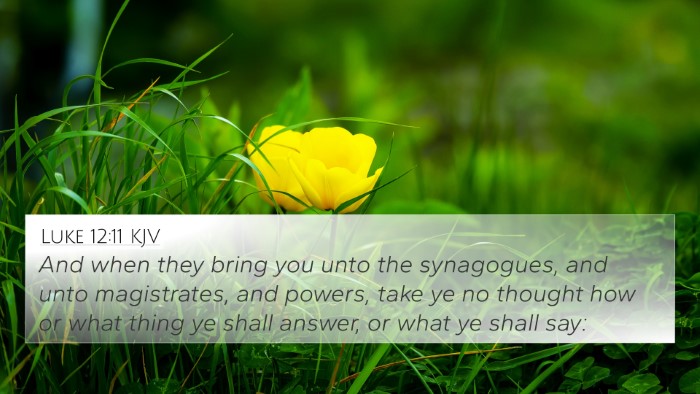Bible Verse Meaning and Interpretation of Luke 21:14
Luke 21:14 states: "Settle it therefore in your hearts, not to meditate before what ye shall answer:" This verse comes as part of Jesus' discourse on the signs of the times, particularly regarding the trials and persecutions that His followers would face. Here, Jesus encourages His disciples to remain steadfast and rely on the Holy Spirit for guidance during those challenging moments.
Summary of Interpretations
This verse emphasizes the importance of preparation not through human wisdom or premeditation, but through divine inspiration. Below are insights gathered from notable public domain commentaries:
- Matthew Henry: Henry states that this instruction to not premeditate their defense reflects the faith and reliance disciples must have on God. He highlights that the Holy Spirit will provide the right words when needed.
- Albert Barnes: Barnes elaborates that this passage reassures believers that they will not be left to their own devices in times of trouble; rather, they will be endowed with wisdom and utterance from God to articulate their message.
- Adam Clarke: Clarke interprets this verse as an encouragement against anxiety. He suggests that the absence of premeditation indicates a faith greater than preparation, relying on the Spirit's immediacy.
Key Themes and Connections
This verse connects various thematic areas within the Bible, particularly concerning faith, reliance on the Holy Spirit, and preparation for trials. Below are some thematic connections and cross-references:
- Acts 4:8-12: This passage shows Peter speaking boldly, inspired by the Holy Spirit, demonstrating how God enables His followers to speak in challenging situations.
- Matthew 10:19-20: Jesus makes a similar promise that when His followers are persecuted, they will be given what to say by the Spirit.
- 1 Peter 3:15: Peter encourages believers to always be prepared to give an answer for their hope, correlating with the readiness Jesus commands in Luke 21:14.
- James 1:5: This verse invites believers to seek wisdom from God, aligning with the theme of divine guidance in speech.
- John 14:26: Jesus promises the Holy Spirit will teach and remind us of everything He has spoken, underscoring reliance on divine inspiration.
- Matthew 28:20: Jesus assures His presence until the end, emphasizing that He equips His followers through trials.
- Romans 8:26: The Spirit helps in our weaknesses, providing assurance that we are not alone in uncertain times.
Implications for Believers
Luke 21:14 serves as a powerful reminder for Christians about the reliance on divine wisdom when confronted with adversities. Understanding this verse involves recognizing the balance between preparation and trust in God's timing.
The promise that the Holy Spirit will provide appropriate words eliminates the need for anxiety and self-reliance in delivering one’s testimony. As believers grow in faith and understanding, they learn to embrace situations not as obstacles but as opportunities showcasing God's glory through their response and the divine wisdom granted to them.
Practical Application
Here are some practical ways believers can apply the message of Luke 21:14 in their lives:
- Prayer for Guidance: Regularly ask the Holy Spirit for insight and wisdom when facing challenging situations.
- Scripture Memorization: Internalizing key verses related to defense and faith can help in recalling these truths during difficult times.
- Engagement in Community: Share experiences with fellow believers to build faith through testimonies of divine assistance in trials.
- Bible Study: Use a Bible cross-reference guide to connect and deepen understanding between related passages.
- Seeking Knowledge: Utilize tools for Bible cross-referencing to explore interconnections between verses that offer encouragement and wisdom.
Conclusion
Luke 21:14 illustrates the depth of faith required to navigate through trials with confidence in God’s provision. The verse invites believers to dismiss worry about their responses and trust that, through the Holy Spirit, they will receive the knowledge and utterance needed at the right moment.
In conclusion, this biblical verse stands as an essential piece in understanding the relationship between faith and divine guidance for anyone studying the Scriptures. Engaging deeply with Luke 21:14 through cross-references unlocks rich conversations across the breadth of the Bible, fostering a holistic understanding of how God supports His people.





